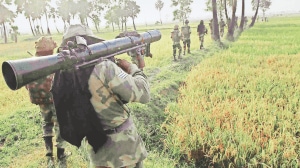PM tells US Congress why India fit for new N-deal
Even as he savours the historic nuclear reconciliation with the Bush Administration, Prime Minister Manmohan Singh today reached out to the ...

Even as he savours the historic nuclear reconciliation with the Bush Administration, Prime Minister Manmohan Singh today reached out to the US Congress which must change American non-proliferation laws to allow civilian nuclear commerce with India.
Informing the Congress of his nuclear pact with President Bush, Singh declared that India is ‘‘fully conscious of the immense responsibilities that come with the possession of advanced technologies, both civilian and strategic’’.
Aware of the potential opposition in the Congress to the Indo-US nuclear pact from the vociferous arms control lobby, Singh underlined India’s ‘‘impeccable’’ track record on nuclear non-proliferation.
The non-proliferation fundamentalists in Washington have been shell-shocked by the sweeping nature of the deal between Singh and Bush, which promises comprehensive Indo-US civilian nuclear cooperation. As Bush seeks to convince the US Congress that India’s nukes are ‘‘good’’ while demanding tough action against the ‘‘bad nukes’’ of North Korea, Iran and other wannabe atomic powers in the Middle East, there will be hoarse cries against a nuclear exemption for India.
Congressman Edward Markey, a leading champion of non-proliferation, told the Washington Post that he will introduce a legislation to block the deal with India.
‘‘We cannot play favourites, breaking the rules of the Non-Proliferation Treaty to favour one nation at the risk of undermining critical international treaties,’’ he thundered.
Addressing some of that criticism, Singh told the Congress, amidst applause: ‘‘We have adhered scrupulously to every rule and canon’’ in the area of non-proliferation and ‘‘we have never been, and will never be, a source of proliferation of sensitive technologies’’.
Singh’s advisers will hope that the repeated applause from the Congress to his speech will translate into legislative support when Bush moves the Congress for the modification of its nuclear laws in favour of India.
When he speaks to the Indian community tonight, Singh would naturally want them to support the Bush nuclear initiative with India.
Singh emphasised that India has followed responsible nuclear policies, despite having ‘‘witnessed unchecked proliferation in our own neighbourhood, which has directly affected our security interests’’.
In obliquely referring to the Chinese nuclear and missile cooperation with Pakistan, and Pakistan’s cavalier export of sensitive nuclear technologies to North Korea and the Middle East, Singh was making a very important differentiation between the nuclear policies of India and Pakistan.
In 1998 May when India’s nuclear tests were followed by those of Pakistan, the difference between the nuclear approaches of the two nations was lost. In arriving at a nuclear deal with the Bush Administration and getting it approved by the US Congress, India is trying to separate itself from Pakistan on the nuclear question.
As Pakistan will inevitably press the Bush Administration for the civilian nuclear deal that has been offered to India, Singh will hope that the question of being a responsible nuclear weapon power will make all the political difference.
Besides convincing the US Congress, India will also have to work with the international community to make the necessary changes in the international rules of nuclear commerce in favour of India. While there will be opposition from many smaller European countries, which tend to be more British than the King on non-proliferation, Singh will hope that the support from Russia and France, which are keen on civilian nuclear cooperation with India, will help change the rules of the Nuclear Suppliers Group (NSG).
But there will be a big question mark over the Chinese attitude to the Indo-US nuclear deal. When India conducted its nuclear tests in May 1998, China joined President Bill Clinton in condemning Delhi. It remains to be seen if Beijing, which is now a member of the NSG, tries to block the American effort to rewrite the nuclear rules to accommodate India or not. India would also carefully watch whether China would directly or indirectly back Pakistan’s demand for nuclear parity with Delhi at the NSG.
But the indications here are that while it is determined to go through a consultative process with other members of the NSG, the Bush Administration is unlikely to give China a veto over the grand nuclear bargain between Delhi and Washington.
|
‘India’s growth & prosperity are in American interest’
|
||
|
Prime Minister Manmohan Singh at the joint session of the US Congress: |
||



- 01
- 02
- 03
- 04
- 05




























